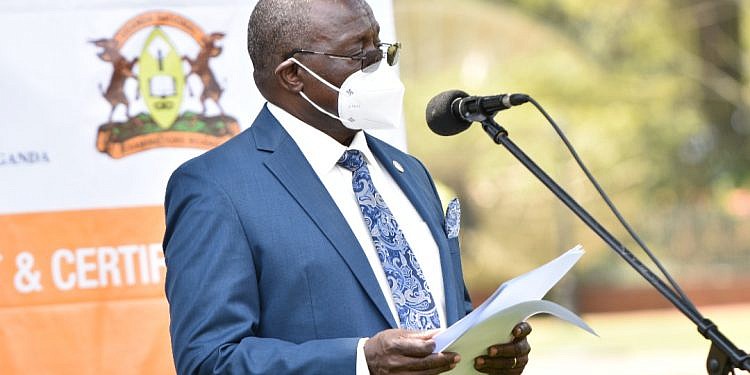The 2024 Uganda Certificate of Education exam results released on Tuesday indicated that 350,146 candidates representing 98.05% of the candidates who sat qualified for the UCE certificate.
UNEB Executive Director, Dan Odongo said this this will be indicated on the Transcript and Certificate as Result 1 while the candidates who did not fulfil the conditions for the award of the UCE certificate will have Result 2 indicated on their transcripts.
“These are candidates who did not sit for some compulsory subjects, or did not sit for a minimum of eight subjects, or who have no Project Work scores.”
He said Result 3 will be will be indicated on the transcript of a candidate who has not met the minimum level in all the subjects; i.e. the candidate will have only achievement level E in all subjects taken.
“Candidates with Result 2 and 3 respectively shown on their Transcripts do not qualify for a UCE certificate.”
The results also indicate that girls performed better in English language and Christian Religious Education than their male counterparts under the new curriculum.
According to UNEB Executive Director, Dan Odongo, the girls also demonstrated higher achievement levels in Art and Design.
“In the other subjects; History and Political Education, Geography, Mathematics, Agriculture, Chemistry and Biology, the proportions of females in the exceptional and outstanding levels are lower than that of males,” Odongo said.
UNEB said overall, there was exceptional performance in Art and Design, History and Political Education, Agriculture and Mathematics.
“Proportions of candidates achieving at the elementary level (below basic level) are most significant in Physics followed by Chemistry and then English Language.”
Odongo said reports from examiners indicate that in the Science practical assessments, candidates were expected to use a given scenario and materials provided to develop aims and a hypothesis, plan and carry out investigations and draw conclusions.
“The main problem observed is the failure of candidates to interpret the scenarios, or connect the scenarios and the materials supplied to real life situations, or interpret the results of the experiments carried out and create meaning connected to everyday situations. Candidates that appear not to have been guided properly tried to use recall to respond to the scenarios.”
He said in English and other foreign languages, the challenges observed have been inadequate vocabulary; inability to paraphrase (use own words without copying directly from a given text) in summary writing; use of inappropriate examples in comprehension texts or literature analysis.
“ In those languages where speaking was part of the assessment, candidates demonstrated a fair understanding of the given scenarios and responded fairly. The challenge that cuts across all areas is the difficulty candidates showed in linking scenarios to problem solving in real life situations. This competency is at the core of the curriculum and implies that teachers need to do much more to guide the learners towards this focus.”







































